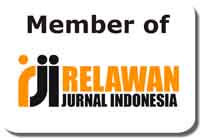Students’ Self-Efficacy of Nicenet in EFL Classroom
Abstract
Keywords
Full Text:
PDFReferences
Bandura, A. (1986) Social foundations of thoughts and action: A social cognitive theory. Englewood Cliffs, NJ: Prentice-Hall,
Bandura, A. (1997) Self-efficacy: The exercise of control. New York: Freeman.
Buzetto .N.A. (2008). Student Perceptions of Various E-Learning Components. Interdisciplinary Journal of E-Learning and Learning Objects Volume 4, 2008. www.ijello.org/Volume4/IJELLOv4p113-135Buzzetto413.pdf
Eachus, P, & Cassidy, S. (2002) Developing the computer self-efficacy (CSE) scale: Investigating the relationship between CSE, gender and experience with computers”. Journal of Educational Computing Research, 26 (2), 133-153
Fageeh, A. I. (2011) EFL Learners' Use of Blogging for Developing Writing Skills and Enhancing Attitudes Towards English Learning:An exploratory Study. Journal of Language and Literature Vol 2 (1) , 31-46.
Fulkerth, B. (1998) A bridge for distance education: Planning for the information age student. Syllabus, 12 (4), 3-5.
Green, K. C. (1998). Campus computing 1998: The ninth annual survey of desktop computing and information technology in higher education,
Encino, CA: The Campus Computing Project.
Jurczyk, J., Benson, S.N.K. and Savery, J.R. (2004) Measuring Student Perceptions in Web-Based Courses: A Standards-Based Approach, Online Journal of Distance Learning Administration (7:4), Winter 2004.
Katie, N, (2009), Introduction to Nicenet”. Madeira High School Retrieved from https://www.google.com/search?q=Katie%2C+2009&ie=utf-8&oe=utf 8#q=Katie%2C+2009+Nicenet .
Lapan, R. T., Boggs, K. R., & Morrill, W. H. (1989).Self-efficacy as a mediator of investigative and realistic general occupational themes on the Strong-Campbell Interest Inventory Journal of Counseling Psychology, 36, 176-182.
Lee J.W & Mendlinger. S . (2011). Perceived self efficacy and its online learning acceptance and students satisfaction. Journal of service science management, 2011, 4, 243-252
Lee, J.K. and Hwang, C.Y. (2007). The effects of computer self-efficacy and learning management system quality on e-Learner’s satisfaction. In
Cameron, L., Voerman, A. and Dalziel,J. (Eds), Proceedings of the 2007 European LAMS Conference: Designing the future of learning (pp73-79), Greenwich: LAMS Foundation.
Lent, R. W., Lopez, F. G., & Bieschke, K. J. (1993). Predicting mathematics-related choice and success behaviors: Test of an expanded social cognitive model. Journal of Vocational Behavior, 42, 223-236.
Marakas, M. Yi and R. Johnson., (1998). The Multilevel and Multifaceted Character of Computer Self-Efficacy: Toward Clarification of the Construct and an Integrative Framework for Reason. Information Systems Research, Vol. 9, (2) 1998, pp. 126-163. doi:10.1287/isre.9.2.126
Mohamed, N, Karim. A, N.S. (2012) Computer Application Anxiety, Self-Efficacy and Open Source Learning Management System Acceptance . Latest Advances in Information Science and Applications. www.wseas.us/e-library/conferences/2012/Singapore/.../ACCIDS-45.pdf
Sax, L. J., Astin, A. W., Korn, W. S., & Mahoney, K. M. (1998). The American freshman: National norms for Fall 1998, Los Angeles, CA: Higher Education Research Institute, University of California at Los Angeles Graduate School of Education and Information Studies.
Schaub, M., & Tokar, D. M. (2005) The role of personality and learning experiences in social cognitive career theory. Journal of Vocational Behavior, 66, 304–325. doi:10.1016/j.jvb.2004.09.005
Schunk, D. H. (1981). Modeling and attributional effects on children's achievement: A self-efficacy analysis. Journal of Educational Psychology, 73, 93-105.
Smart, K.L. and Cappel, J.J., (2006) Students’ Perceptions of Online Learning: A Comparative Study, Journal of Information Technology Education (5), 2006, pp. 201-219.
Stone, D. N. (1994) Overconfidence in initial self-efficacy judgments: Effects on decision processes and performance. Organizational Behavior and Human Decision Processes, 59(3), 452-474.
Suharno, Endang Siti Astuti, Kusdi Raharjo, Kertahadi ., (2014) The Effect Of Computer Self-Efficacy Toward System Quality, Information Quality, Service Quality, Usage, User Satisfaction, And Individual Impact (A Study on University Students Using the E-Learning System at Kopertis III Jakarta. Journal of Information Engineering and Application Vol 4. (4)
Zeldin, A. L. & Pajares, F. (1997) Against the odds: Self-efficacy beliefs of women with math-related careers. Paper presented at the meeting of the American Educational Research Association, Chicago.
DOI: http://dx.doi.org/10.31332/lkw.v3i2.617
Copyright (c) 2018 Anita Rezki

This work is licensed under a Creative Commons Attribution-ShareAlike 4.0 International License.
Langkawi: Journal of The Association for Arabic and English indexed by:


















.png)
.png)

.png)
2.png)








